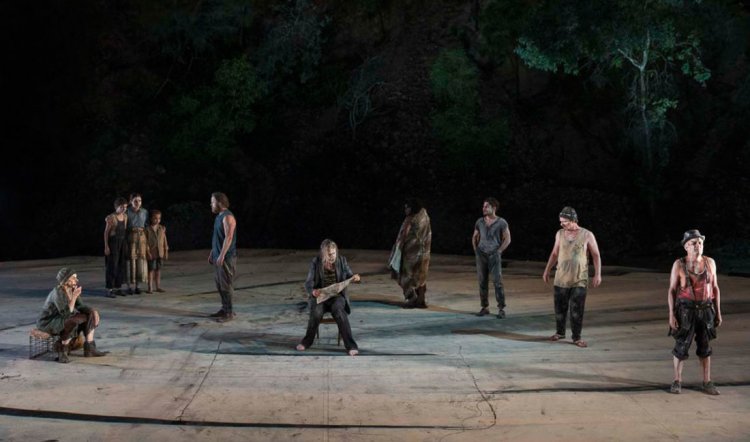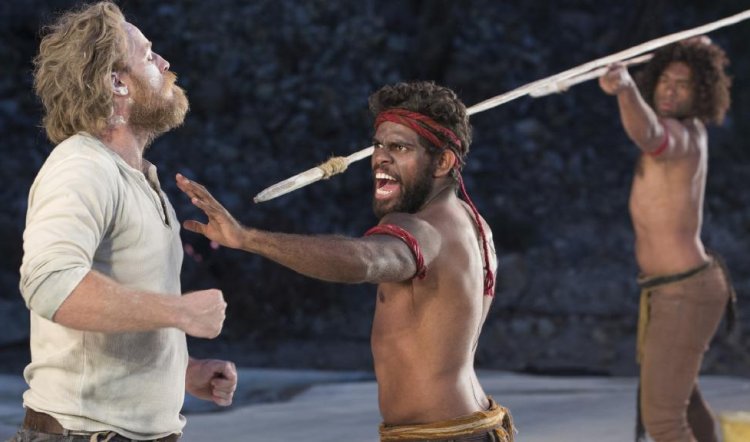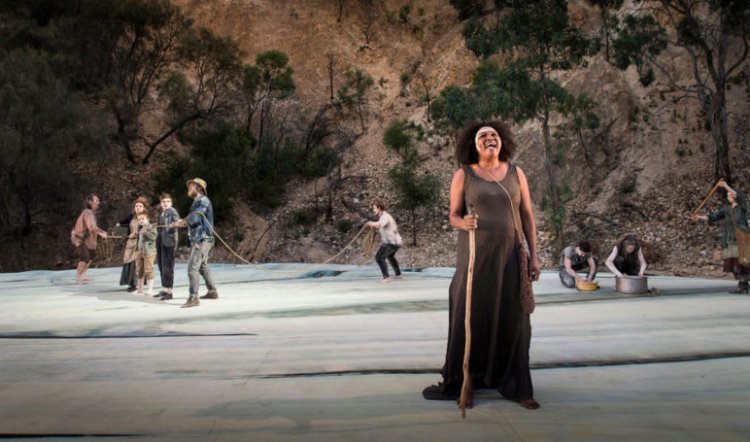
THE SECRET RIVER - ADELAIDE
THE SECRET RIVER – Adelaide Festival and Sydney Theatre Company at The Quarry, Anstey Hill, 28 February-19 March 2017
When Andrew Bovell’s adaptation of Kate Grenville’s already classic bio-novel of life on the penal colony’s major waterway opened at the Sydney Festival in 2013 it was an immediate hit. More than that, however, it hit nerves in the subconscious and conscience that continued to quiver until it returned to the Roslyn Packer Theatre stage for another sold out season in 2016.
The piece was the first commission by Cate Blanchett when she and Andrew Upton took over artistic directorship of the STC. She pushed and shoved and worried at it through all hiccups, tribulations and setbacks and it will probably outlive her “greening” of the Wharf as the most socially and artistically important project of that era.
Directed throughout by Neil Armfield, it was on the top of his list when he and Rachel Healy became co-artistic directors of the Adelaide Festival. And their programming of it in a quarry at the foot of the Adelaide Hills is an act of dramatic bravura and rightness. It bookends another unforgettable theatrical achievement, his five-hour epic Cloudstreet at Berth 9 on Sydney harbour in 1998.
Adelaide has a history of utilising very big holes for theatre, starting with Peter Brook’s fabled Mahabharata, and although The Secret River is neither of that length nor conventionally heroic in scale, its significance for Australians is as memorable and arguably more far-reaching.
Freed convict William Thornhill (Nathaniel Dean) was a riverboat man on the Thames before falling foul of Georgian England’s vicious laws. His wife Sal (Georgia Adamson) dreams only of returning to “the Borough”, the stinking slum in south London that was their home. Their two sons are still just boys and happy to be alive and free to roam.

Will gravitates naturally to the Hawkesbury and a particular 100-acre patch of Dharug land on its banks. Thornhill Point, as Will proudly names it, is also what he finally tells the people that come out of the trees to see what he’s up to, “my place now”. In this simple seemingly innocent statement is summed up every act of colonisation and theft across the British Empire. Astounding.
The play is narrated and observed from the margins by Dhirrumbi (Ningali Lawford) and she tells the audience the story she already knows, like the river flowing to the sea. Her tone and stance are so dispassionate as to rip the heart and wrongness from the staunchest believer in White right.
Dhirrumbi aside, the Dharug do not speak English and we in the bleachers along with the Thornhills have to cope – just as they did in 1806; it’s electrifying and makes perfect sense. And it is, of course, the small boys who first break through as they make friends and play and inevitably begin to understand one another. It’s a masterstroke by playwright Andrew Bovell.
What happens over the course of time is effortlessly sketched in throughout the production: corn is heedlessly planted over a yam patch, a rough hut is built, a boat is rowed upriver. Most of the time, a fire smoulders away in a fireplace used by both groups of inhabitants by turn. For a while at least, life goes on. The elder Yalamundi (Stephen Goldsmith) watches and waits; the younger man Ngalamalum (Shaka Cook) is less patient but equally bewildered by these weird, helpless creatures.
The stage area is actually a vast canvas floor, glossily painted the silver-white-sky of the river on a rare good day. On one side are the massive ranks of bleachers – enough to hold a thousand and full every night. Yet the bleachers are dwarfed by the stage’s backdrop. Rising in a shimmer of heat in the late afternoon, the quarry’s crumbling rock wall, studded with an occasional bold sapling, are reminiscent of the Hawkesbury’s sandstone cliffs. “Rusty” lighting towers border the stage and are the source of glorious effects that play throughout on the rock and vast shadowy gums on either side. As the sun goes down the roof is a starry sky and when they talk of the moon being the same as the one over London town, there it is!

The members of the creative team did wonders in the Sydney/Ros theatre and extend themselves in the quarry: Stephen Curtis’s set, Mark Howett’s lighting and Tess Schofield’s costumes (you’d swear you can smell them). Beside the lighting tower, Iain Grandage performs his own musical score on piano, electronics and cello, accompanied from time to time by members of the cast on other instruments. It adds another layer of meaning and is lovely and terrible by turn. In this vast setting, the actors too are wired for sound and Steve Francis has done a magnificent job combining the disparate elements.
Kate Grenville’s The Secret River was first published in Australia in 2005 and since then, in more than 20 countries. As well as becoming an instant bestseller and classic, it’s already been read by a generation of school and university students and been nominated for and won many prizes. Andrew Bovell’s adaptation has taken it to another level in depicting the two tribes and the awful inevitability of the outcome.
When the basically decent Will gets caught up in events leading to a massacre of the Dharug it’s modern Australian history in microcosm: “We will not speak of this again,” he solemnly intones to Sal and his boys. And that’s exactly what happened, across the colony, across the states, across the country, across the centuries. Then Kate Grenville joined the Walk for Reconciliation over Sydney Harbour Bridge on 28 May 2000 and the questions that arose in her mind about her family’s past finally became the book.
Similar questions as well as wonder at a way of life long gone – for both sides – are palpable in the rapidly chilling evening air of the quarry. Like the best and worst of stories, it’s frequently funny and the situations as comical as only humans can make them. It is however, at heart, a story of such importance to Australia that anyone of pretty much any age who can get to Anstey Hill this summer season should do so. More than recommended.
Comments
Leave a Comment
Enter your username and password to comment. Don't have a username? Register now.




Be the first to leave a comment below